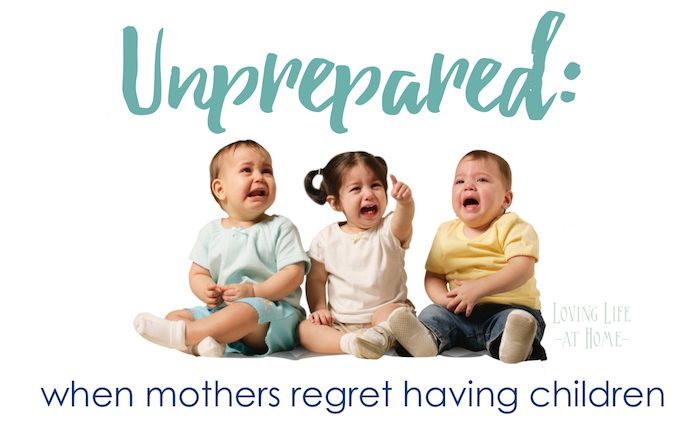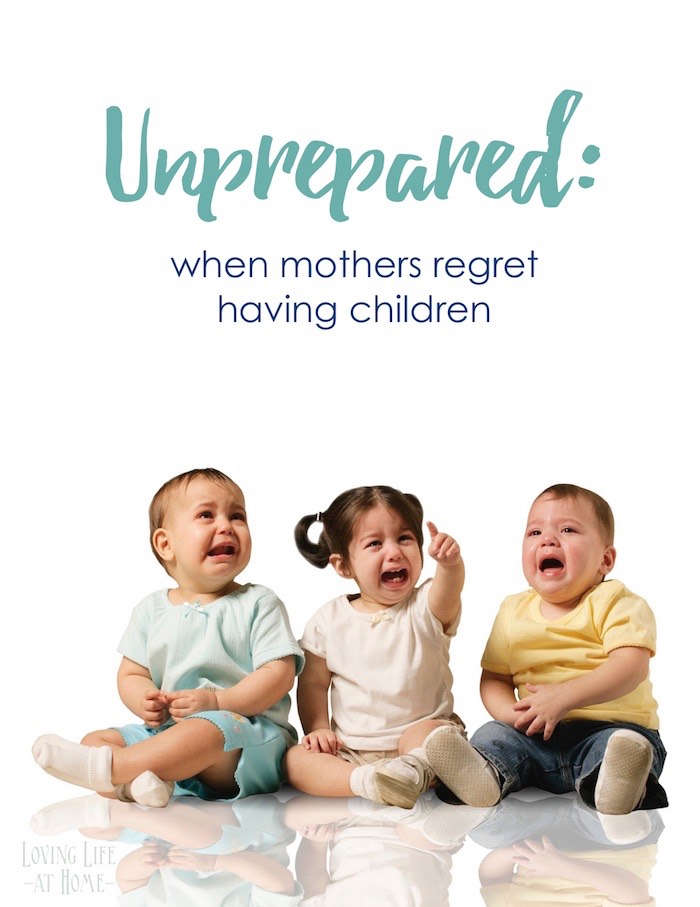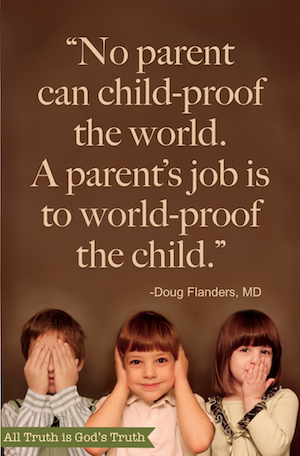Women who Wish They Never Had Kids

A friend of mine recently sent me a link to an article that I’m having a hard time wrapping my mind around. The author was investigating “the growing movement of women who wish they’d never had kids.”
I read every word of the article, completely bewildered. The notion that enough mothers feel remorse over having had children to constitute “a movement” is tragic and heartbreaking. It’s heartbreaking for the women themselves, who are missing out on the joys normally associated with motherhood. But it’s especially heartbreaking for their children, who are growing up with mothers who, given their druthers, would wish them out of existence — and are increasingly vocal about feeling that way.
As a mother of twelve who is delighted she had children (and would gladly have more), I admit I cannot relate to the emotions expressed by the women interviewed for this article. But after mulling it over, I’ve come up with a few reasons why, perhaps, some of them feel the way they do.
Of course, reasons will vary from woman to woman and may encompass causes far beyond anything mentioned here, but if “motherhood regret” is on the rise — if it has indeed become a social movement, as this article implies — then we should be able to look at current cultural trends to help explain it.
I can think of several cultural norms likely to color the way a woman views, accepts, and carries out the responsibilities of being a mother. These include the following:
Fragmented families
Parenting was meant to be a 2-person project, but with skyrocketing rates of divorce and single-parent households, the full responsibility for child training is often born by the mother alone.
That’s a heavy task for one set of shoulders, and I can see how it might cause a woman to question some of her life choices.
As tempting as it may be to feel sorry for ourselves in such a situation, a lifetime spent blaming innocent children for our own unhappiness is no kind of solution. Instead, we need to embrace the life we’ve been given, learn from past mistakes (many of which were undoubtedly made before children ever arrived on the scene), and do our best to make wiser decisions going forward.
Altered emotional states
The past few decades have been marked by an explosion of prescription drug use. Four out of five sexually-experienced women have used hormonal contraceptives. One in four is currently taking some form of antidepressant. Both of these drugs have been shown to lower libido and to adversely affect the feelings of love a woman has for her mate.
Is it possible that these drugs might also interfere with mother-child bonding and have a negative effect on the love a mother feels for her child? Could the growing trend of “mother remorse” be more reflective of the drugs circulating in women’s bodies than of the secret desires of their hearts?
Desire for instant gratification
We live in a society that hates having to wait for anything. We want what we want, and we want it now: Instant rewards, with all the bells and whistles.
But child rearing is an endeavor more akin to constructing cathedrals than to playing Candy Crush. It takes grit and determination and perseverance.
Building a family is a multi-generational undertaking. Although we can take joy in watching the slow, steady progress made in our lifetime, we know from the beginning we won’t likely live to see it to completion. The work will continue long after we’re gone. Why not entrust it to God from the beginning?
Loss of faith in God
I don’t know how anybody can muster the level of devotion required by parenting without maintaining a vibrant faith in God. God grants wisdom and strength for living. He provides a beautiful example of the kind of self-sacrificing love a mother should have for her child.
Belief in God gives life purpose and meaning. When we throw God out of the equation, we throw out hope and reason, as well. Is it any wonder that life seems pointless and despairing to creatures cut off from their Creator?
Where there is no understanding of eternity and accountability, life devolves into a continual striving after fleeting temporal pleasures, then feeling cheated when we can neither grasp nor hold on to them.
Devaluation of life
Since 1980, over 1.4 billion babies have been aborted worldwide. Nearly 850,000 have been killed in the US this year (so far). As a society, we have decided that babies are more of a burden than a blessing and are therefore expendable.
Unfortunately, that wrong-headed but pervasive attitude trickles down and affects how even the lucky children who are given a shot at life are treated. It has become fashionable for mothers to try and outdo one another with complaints about how much trouble they have with their kids. The “Mother Regret” described in the aforementioned article is just an extreme form of what many of us do every day — and all within earshot of our children. Think what messages we are sending them!
Meanwhile, there are women who are single or struggling with infertility who would gladly lay down their life for the privilege of having a baby all their own. It hardly seems fair that someone who has children could so deeply regret ever giving birth, while another who so desperately longs to be a mother might never be given the opportunity at all.
Hectic schedules
Perhaps the “trapped” feeling some of these remorseful moms describe has something to do with the misguided brand of parenting they are attempting.
If I were constantly having to run my children from one extracurricular activity to another to another to another, I think I’d feel trapped, too — but it would be in a prison of my own making. Constant activity is not a prerequisite to raising successful, well-rounded children. Kids need downtime, too: Time to think and wonder and dream and plan. Time for unstructured play. Time spent at home, totally unplugged from the digital devices that so permeate our lives these days.
They also need the stability that comes from Mom reserving a good portion of her energy to build up her husband and invest in her marriage — for that should be the central relationship of the home. Things get thrown off kilter fast when we try to make everything revolve around the children, instead. That endless state of go-go-go and more-more-more that has become characteristic of so many households tends to separate the family in unhealthy ways and ultimately does more damage than good.
Lack of knowledge and experience
Most women in our society — myself included — are woefully unprepared for the responsibilities of marriage and motherhood when we first take them on. The home economics and child development classes of yesteryear have been replaced by women’s studies requirements that do nothing to help us become better wives and mothers (in fact, they actively work against it).
The good news is, on-the-job-training is still quite effective for motivated students, even though the learning curve may be pretty steep. Look for a good mentor — an older woman who is further down life’s road than you and has a good track record in the marriage and motherhood department (Titus 2:3-5). Read books and blogs by authors who love husband and children and embrace their roles with joy and grace.
Differing notions of success
How do the women’s studies courses we find on university campuses today “actively work against” our becoming better wives and mothers? They do it by pushing a social agenda that turns traditional family structure on its head.
Women are taught they must enter the workforce to realize their full potential. Those who would opt to stay home baking cookies for their kids instead of climbing the corporate ladder are cast as brainwashed dummies with no drive or vision.
Society at large echoes these sentiments, and many women have bought into the lies without question. Is it any wonder that a mother who has been conditioned to think in such a vein would feel trapped and miserable in the role of stay-at-home-mom?
I’m not arguing that career women can’t do meaningful, fulfilling, and important work. Many of them obviously do, and I’m grateful for all the dedicated women whose work has both directly and indirectly impacted my own life.
What I am saying is that there is a much broader scope for industry, influence, and meaningful work in the home than our current culture seems willing to recognize, and that — for mothers of young children especially — the potential that exists in the home for shaping the next generation should not be minimized, ignored, or surrendered to others without careful consideration.
Unbridled selfishness
It would be oversimplifying to blame the “mommy regret movement” solely on selfishness, but selfishness definitely plays a part.
As a society, we have become so self-absorbed and me-focused that we often lose sight of the needs of others. In doing so, we’ve neglected our God-given responsibility to take at least a portion of the gifts and resources He’s given us and use them to invest in the lives of others.
One of the many benefits of becoming a mother is that raising children helps root such ugly selfishness out of our hearts.
Or, at least, it will… if we let it.







Some people shouldn’t be parents. My son has categorically stated that he doesn’t want a family of his own. Knowing him as I do, I agree with him.
It has never been my goal to talk people into raising children who have no desire to be parents.
Great thoughts on this very sad “movement”. I am a graduate of a prestigious university and after several years in the work force, I had great career potential, but I willingly and joyfully chose the privilege of staying home with our four children, and have not one moment of regret. Children are indeed a gift from the Lord!
This really does make me sad. As a woman experiencing infertility it really makes me boil. We really don’t know what we have until its taken from us. Lets pray for an end to abortion and treating our children like they are ornaments. Each one matters!
Amen!
I agree completely! Thank you for sharing and encouraging me to speak joyful thankful words more often about my children. They are such a blessing!
Great article, Jennifer. I love your blog! Thanks for the info.
Glad you like it, Angela. Thanks for the encouragement!
What a beautiful article , very well said . As a mom of 4, who are now young adults, 17-24. I think about their thoughts on future parenthood, as I have heard a couple of them say they do not want children.
It’s a very sad thought as a mom. I pray they will meet the perfect mate and God will bless them with children.
That would make me sad, too, Adriana. Having grandchildren is a wonderful blessing I pray you’ll get to experience yourself some day.
Thank you Jennifer for your kind words. I love your blog.